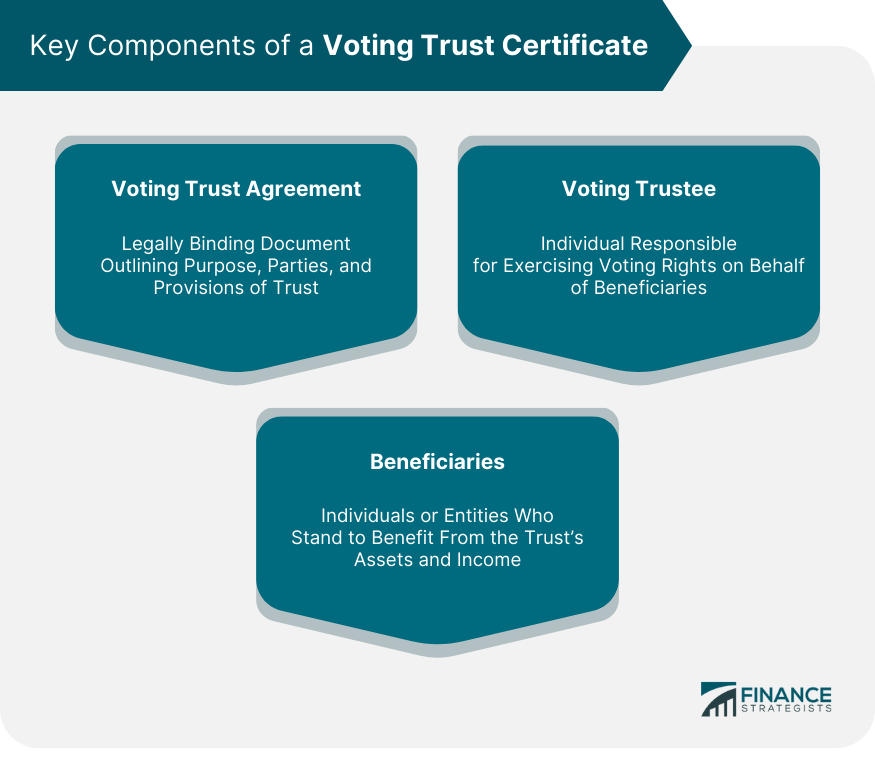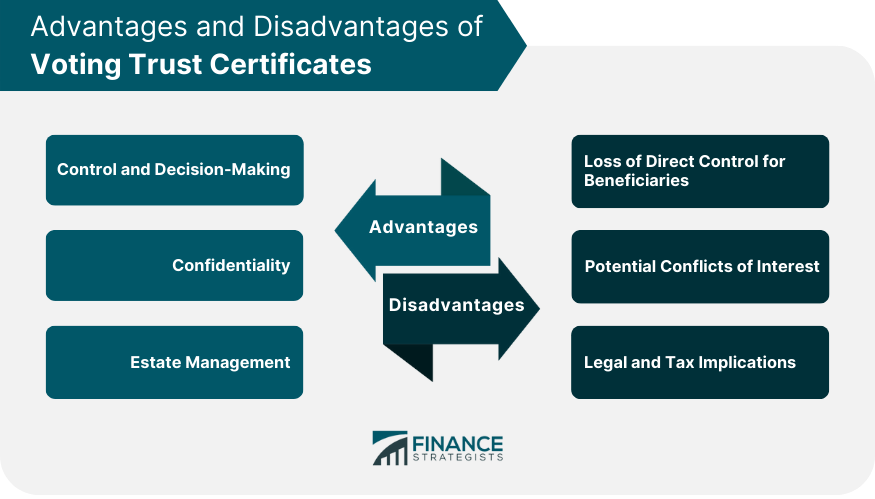A Voting Trust Certificate is a legal instrument that transfers the voting rights associated with certain securities, such as stocks or bonds, from their original owners to a designated trustee. This arrangement allows the trustee to exercise voting control and make decisions on behalf of the beneficiaries while maintaining a unified and consistent approach. Often used in estate planning, Voting Trust Certificates can provide advantages such as centralized decision-making, confidentiality, and professional management of the assets involved. A Voting Trust Agreement is a legally binding document that outlines the purpose, parties involved, and key provisions governing the Voting Trust Certificate. The agreement is typically executed between the grantor (the individual creating the trust), the trustee (the person responsible for managing the trust), and the beneficiaries (those who stand to benefit from the trust). The primary purpose of a Voting Trust Agreement is to transfer the voting rights of certain securities (such as stocks) from the grantor to the voting trustee. This enables the trustee to exercise voting control over the assets on behalf of the beneficiaries. The agreement should clearly define the roles and responsibilities of all parties involved, as well as any limitations or restrictions on the trustee's powers. Some essential provisions to include in a Voting Trust Agreement are: The specific assets subject to the trust, such as stocks, bonds, or other securities. The duration of the trust, which may be indefinite or for a specified period. The trustee's powers, duties, and compensation. The rights and limitations of beneficiaries, including the distribution of income and assets. Provisions for the removal and replacement of the trustee, if necessary. The Voting Trustee is a central figure in the administration of a Voting Trust Certificate, responsible for exercising the voting rights of the trust assets on behalf of the beneficiaries. The primary responsibility of the Voting Trustee is to vote on matters affecting the trust assets, such as corporate governance issues, mergers and acquisitions, and other significant decisions. Additionally, the trustee must act in the best interests of the beneficiaries, manage the trust assets prudently, and adhere to the terms of the Voting Trust Agreement. When selecting a Voting Trustee, it is essential to consider the individual's experience, expertise, and integrity. A suitable candidate should possess a strong understanding of the relevant industry, as well as a track record of prudent decision-making and ethical conduct. An estate planning lawyer can assist in identifying potential candidates and evaluating their qualifications and suitability for the role. Beneficiaries are the individuals or entities who stand to benefit from the Voting Trust Certificate. Their rights and limitations, as well as the types of beneficiaries, should be clearly outlined in the Voting Trust Agreement. While beneficiaries do not directly control the voting rights of the trust assets, they retain certain rights and protections under the Voting Trust Agreement. These may include the right to receive income or distributions from the trust, the right to information about the trust's administration, and the right to challenge the trustee's decisions in certain circumstances. There are two primary types of beneficiaries in a Voting Trust Certificate: income beneficiaries and remainder beneficiaries. Income beneficiaries receive income or distributions from the trust during its term, while the remainder of beneficiaries receives any remaining trust assets upon its termination. Voting Trust Certificates offer several benefits in the context of estate planning, including control and decision-making, confidentiality, and professional estate management. One of the primary advantages of Voting Trust Certificates is the preservation of voting rights and unified control over the estate. By transferring voting rights to a single trustee, the grantor ensures that important decisions concerning the trust assets are made with a consistent and unified approach. This can help prevent disputes among beneficiaries and streamline the decision-making process. Voting Trust Certificates can provide a degree of privacy and confidentiality for the beneficiaries. Since the trustee exercises voting control, beneficiary information may not be disclosed in public records or corporate documents. This added layer of privacy can be especially valuable for high-net-worth individuals and families who wish to maintain discretion concerning their wealth and assets. A Voting Trust Certificate can simplify the process of asset distribution and management in an estate. By centralizing voting control under a single trustee, the trust can more efficiently manage and distribute assets among the beneficiaries. Additionally, the trustee's professional oversight and expertise can ensure that the trust assets are managed in the best interests of the beneficiaries and in compliance with the Voting Trust Agreement. Despite their benefits, Voting Trust Certificates also carry certain risks and disadvantages, such as the potential loss of direct control for beneficiaries, conflicts of interest, and legal and tax implications. One drawback of Voting Trust Certificates is the limited involvement of beneficiaries in the decision-making process. Since the trustee holds voting control over the trust assets, beneficiaries may feel disconnected from important decisions affecting their interests. However, the Voting Trust Agreement can provide certain rights and protections for beneficiaries to ensure their interests are properly represented. Another concern with Voting Trust Certificates is the possibility of conflicts of interest arising with the trustee. The trustee's personal interests may, in some cases, conflict with those of the beneficiaries. To mitigate this risk, the Voting Trust Agreement should contain provisions to ensure the trustee's impartiality and outline procedures for addressing potential conflicts of interest. The implementation of a Voting Trust Certificate may involve complex legal and tax considerations. Various regulations and requirements govern the creation and administration of these trusts, and failure to comply with them can result in legal disputes or financial penalties. Additionally, the transfer of assets to a trust can have tax implications for both the grantor and the beneficiaries. It is essential to consult with an estate planning lawyer to navigate these complexities and ensure compliance with all relevant laws and regulations. Estate planning lawyers play a crucial role in the implementation and management of Voting Trust Certificates, from drafting the Voting Trust Agreement to providing ongoing legal support and guidance. An estate planning lawyer's expertise and advice are invaluable in drafting a comprehensive and legally sound Voting Trust Agreement. The lawyer can tailor the agreement to the client's specific needs and circumstances, ensuring that the trust's structure and provisions align with the client's objectives and comply with all applicable laws and regulations. An estate planning lawyer can also assist in the selection of a suitable trustee for the Voting Trust Certificate. The lawyer can help identify potential candidates, evaluate their qualifications and suitability for the role, and provide guidance on the best choice for the client's unique circumstances. Finally, an estate planning lawyer can provide ongoing legal support and guidance throughout the administration of the Voting Trust Certificate. This may involve assisting with trust compliance, addressing legal disputes or challenges, and ensuring that the trustee fulfills their duties in the best interests of the beneficiaries. Voting Trust Certificates serve as a valuable tool in estate planning, particularly for individuals with significant wealth and a diverse portfolio of assets. The key components of a Voting Trust Certificate include the Voting Trust Agreement, the Voting Trustee, and the Beneficiaries, all of which play crucial roles in the trust's implementation and management. The advantages of utilizing a Voting Trust Certificate include unified control, confidentiality, and professional estate management, while potential disadvantages and risks involve the loss of direct control for beneficiaries, conflicts of interest, and legal and tax implications. Given the complexities and potential risks involved in the creation and administration of a Voting Trust Certificate, it is essential to seek the expertise of an estate planning lawyer. They can guide you through the process, draft a comprehensive Voting Trust Agreement, assist with trustee selection, and provide ongoing legal support, ensuring that the trust serves the best interests of all parties involved.What Is a Voting Trust Certificate?
Key Components of a Voting Trust Certificate

Voting Trust Agreement
Purpose and Parties Involved
Key Provisions and Terms
Voting Trustee
Roles and Responsibilities
Qualifications and Selection Process
Beneficiaries
Rights and Limitations
Types of Beneficiaries
Advantages of Voting Trust Certificates in Estate Planning
Control and Decision-Making
Confidentiality
Estate Management
Disadvantages of Voting Trust Certificates
Loss of Direct Control for Beneficiaries
Potential Conflicts of Interest
Legal and Tax Implications

Role of an Estate Planning Lawyer in Voting Trust Certificates
Drafting the Voting Trust Agreement
Assisting With Trustee Selection
Ongoing Legal Support and Guidance
Conclusion
Voting Trust Certificate FAQs
A Voting Trust Certificate is a legal arrangement that transfers the voting rights of certain securities, such as stocks, to a trustee who exercises control over the assets on behalf of the beneficiaries. In estate planning, a Voting Trust Certificate can provide unified control, confidentiality, and professional management of assets, making it a valuable tool for high-net-worth individuals and families.
The main components of a Voting Trust Certificate include the Voting Trust Agreement, which outlines the terms and provisions governing the trust; the Voting Trustee, who is responsible for exercising the voting rights of the trust assets; and the Beneficiaries, who stand to benefit from the trust's assets and income.
A Voting Trust Certificate offers several benefits in estate planning, such as preserving voting rights and unified control over assets, ensuring confidentiality and privacy for beneficiaries, and providing professional estate management through the trustee's expertise and oversight.
Yes, there are potential disadvantages and risks related to Voting Trust Certificates, including the loss of direct control for beneficiaries, potential conflicts of interest with the trustee, and complex legal and tax implications that may arise from transferring assets to a trust.
An estate planning lawyer plays a crucial role in the implementation and management of Voting Trust Certificates by drafting a comprehensive Voting Trust Agreement, assisting with the selection of a suitable trustee, and providing ongoing legal support and guidance throughout the trust's administration.
True Tamplin is a published author, public speaker, CEO of UpDigital, and founder of Finance Strategists.
True is a Certified Educator in Personal Finance (CEPF®), author of The Handy Financial Ratios Guide, a member of the Society for Advancing Business Editing and Writing, contributes to his financial education site, Finance Strategists, and has spoken to various financial communities such as the CFA Institute, as well as university students like his Alma mater, Biola University, where he received a bachelor of science in business and data analytics.
To learn more about True, visit his personal website or view his author profiles on Amazon, Nasdaq and Forbes.











